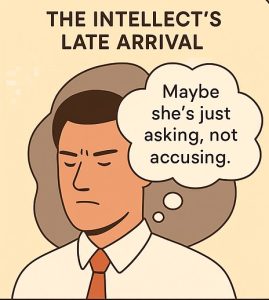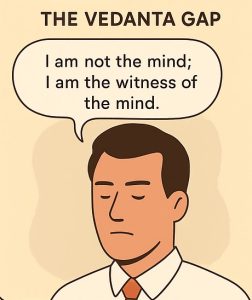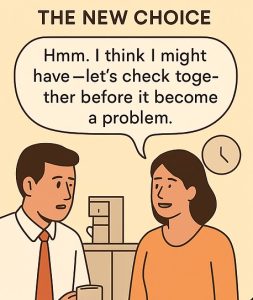The Two Seconds That Changed Arjun’s Life
The Trigger
It’s Friday evening. Arjun walks into the office pantry, still nursing a headache from back-to-back meetings. His colleague Meera makes a casual remark:
Meera: “Hey… did you send the wrong file to the client?”
Inside Arjun’s body — before he can even think — his pulse quickens. Adrenaline surges. His jaw tightens. Cortisol dumps into his bloodstream.
Inner Voice (emotional system): “Attack! Defend yourself! Don’t let her embarrass you.”
The Intellect’s Late Arrival
Half a second later, his intellect (buddhi) tries to step in:
Inner Voice (intellect): “Maybe she’s just asking, not accusing. You could clarify calmly.”
But the hormones have already decided the trajectory. Arjun’s lips are about to snap back with a sarcastic jab.
The Vedanta Gap
Suddenly, a phrase from his morning Vedanta study flashes in his mind:
“I am not the mind; I am the witness of the mind.” (Drg Drishya Viveka)
For just a nano-second, Arjun sees the anger as an object. He’s watching it, not being it.
In that gap — barely a breath — something shifts.
Inner Voice (witness): “Ah… anger is here. But it’s not me.”
The New Choice
Instead of snapping, Arjun exhales.
Arjun: “Hmm, I think I might have — let’s check together before it becomes a problem.”
Meera smiles, relieved.
Hormones start to settle. The conversation stays light.
The Reflection
Walking back to his desk, Arjun realizes:
“Science gave me awareness of stress hormones. Psychology gave me tools to reframe situations.
But Vedanta gave me that tiny gap — the chance to step out of the storm.
That gap is everything. Today it was two seconds. One day it could be my natural state.”
This small incident becomes a seed. Over months, Arjun practices catching the gap earlier and earlier, until calmness becomes as natural as breathing.
1. The Reality of Daily Decisions
Even with a strong intellect and access to science, medicine, or rational analysis, most day-to-day choices are emotion-driven.
- Neuroscience View: Hormones like cortisol, adrenaline, dopamine, and oxytocin strongly bias perception and decision-making
2. The Intellect’s Limited Role
- The intellect can recognize what’s good/bad, healthy/unhealthy.
- But the limbic-hormonal system fires faster than the intellect can intervene.
- This is why willpower alone often fails — the body’s chemical state can overpower reasoning.
Daniel Goleman in Emotional Intelligence:
“Emotions are, in essence, impulses to act, the instant plans for handling life… Hijack is when the limbic brain acts before the neocortex has time to think.”
3. Vedanta’s Unique Leverage
Vedanta trains a micro-second gap between the Self (“Atma”) and the mind-body.
Even if it’s just a nano-second of witnessing — that’s enough to choose a different action.
That “mind controlled” state begins with a flicker of detachment — recognizing “I am not this thought or hormone surge.”
4. From Micro-Gap to Muscle Memory
- Initial Stage: You notice emotions after they act (post-reaction awareness).
- Practice Stage: You catch emotions as they arise — this is the nano-second Vedantic detachment.
- Integration Stage: With repetition, the witness-mode becomes muscle memory.
- Mastery Stage: Even strong hormonal surges lose their grip — the mind stays steady.
5. How This Rewires the Brain
- Neuroplasticity: Repeatedly choosing a detached witness-response rewires synaptic pathways, making it easier to choose calm over reactivity.
- Hormonal Balance: Reduced stress response lowers cortisol spikes, strengthening prefrontal cortex regulation.
- Personality Shift: Over time, this becomes your default temperament, not just a conscious effort.
In Essence:
Vedanta isn’t suppressing emotions but disidentifying from them. That nano-second gap is where freedom lies—a space to choose, reaffirm, and rewire. With (dharana) practice, the gap widens, and what was once a struggle becomes spontaneous wisdom (Sahaja Jnana).




























